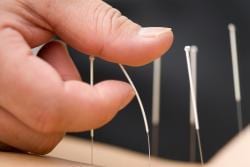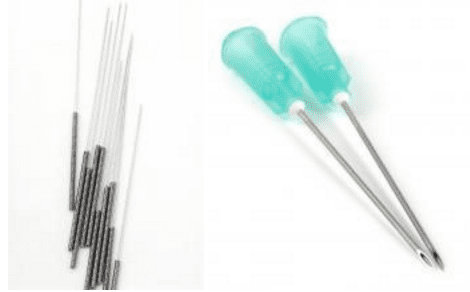FAQ

Acupuncture Needles are about the size of a human hair and are flexible.
The needles are solid and are about the size of a single hair. Unlike hypodermic needles, which are used in Western (allopathic) medicine, the needles are not hollow and are not rigid. The needles are extremely flexible. The acupuncture needles used today are sterilized and used once before being discarded. The needles vary in length because the depth of insertion varies depending upon the location of the body that is being treated. A point on the buttocks, for example, will require a longer needle than a point on the palm of the hand.

Compare the photos above, an acupuncture needle (left) and a hypodermic needle (right). A hypodermic needle is used by Western medicine for drawing blood or injections.
- Adverse reactions to radiation treatment and/or chemotherapy
- Acute abdominal pain>/li>
- Nausea and Vomiting
- Constipation and Diarrhea
- Dysentery (intestinal inflamation)
- Gall/Kidney stones
- Depression and Anxiety
- Pain (joint, extremities, facial, back, neck, postoperative, and arthritic)
- Sciatica
- Sprain
- Headache
- Stroke
- Hypertension and Hypotension
- Allergic rhinitis (hay fever)
- Leukopenia (decrease is white blood cells)
- Dysmenorrhoea (menstrual pain)
- Morning sickness
- Correction of fetus malposition
- Induction of labor
The study also revealed that acupuncture was therapeutic in treating the following conditions:
- Bronchial asthma
- Insomnia
- Earache
- Sore throat
- Nose bleeds
- Panic disorder
- Fibromyalgia (autoimmune disorder)
- Raynaud syndrome (autoimmune disorder)
- Sjögren syndrome (autoimmune disorder)
- Cancer related pain
- Complex regional pain syndrome (chronic pain affecting regions of the body)
- Ulcerative colitis (inflammatory bowel disorder affecting the large intestine)
- Obesity
- Osteoarthritis
- Diabetes (Type II)
- Urinary-tract infection
- Female urethral syndrome (urinary pain and constant urge to urinate)
- Polycystic ovary syndrome
- Hypoovarianism (reduced secretion of ovarian hormones)
- Labor pain
- Lactation deficiency
- Male sexual dysfunction
- Facial spasm and TMJ dysfunction
- Herpes zoster (shingles) and Post-herpetic neuralgia (nerve pain)
- Vertigo, Tinnitus, and Ear congestion
- Alcohol dependence and Detoxification
- Tobacco dependence
- Illicit drug dependence (opium, cocaine, heroin, etc.)
For a complete list of conditions listed in the review, please visit – http://apps.who.int/medicinedocs/pdf/s4926e/s4926e.pdf
There is a growing acceptance of acupuncture by insurance companies. Uptown Acupuncture LLC currently accepts insurance from Blue Cross Blue Shield, CareFrist, Aetna, and Cigna. We are not accepting Medicaid or Medicare at this time, because neither plan covers acupuncture. Coverage under each insurance plan is different. Some plans, for instance, will only cover treatment of certain conditions. There also may be deductibles or copays for your treatment.
Uptown Acupuncture LLC offers free insurance verification prior to your intake appointment. Please contact us for more information.

